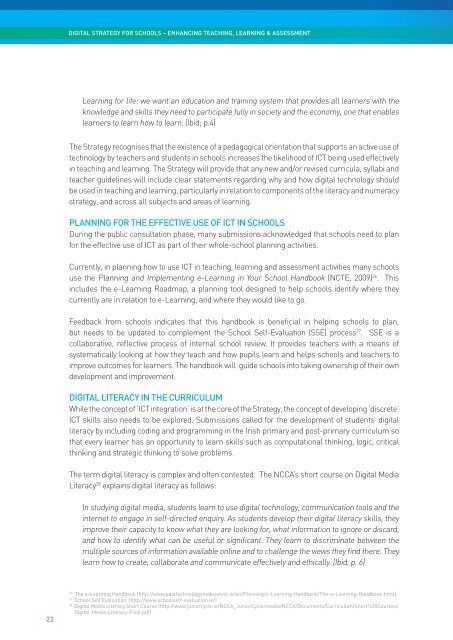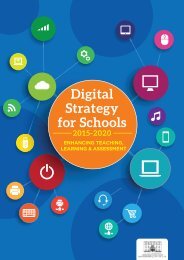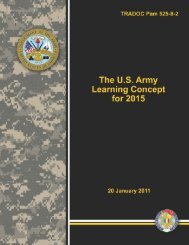Digital Strategy for Schools
TKmef
TKmef
You also want an ePaper? Increase the reach of your titles
YUMPU automatically turns print PDFs into web optimized ePapers that Google loves.
DIGITAL STRATEGY FOR SCHOOLS – ENHANCING TEACHING, LEARNING & ASSESSMENT<br />
Learning <strong>for</strong> life: we want an education and training system that provides all learners with the<br />
knowledge and skills they need to participate fully in society and the economy, one that enables<br />
learners to learn how to learn. (Ibid; p.4)<br />
The <strong>Strategy</strong> recognises that the existence of a pedagogical orientation that supports an active use of<br />
technology by teachers and students in schools increases the likelihood of ICT being used effectively<br />
in teaching and learning. The <strong>Strategy</strong> will provide that any new and/or revised curricula, syllabi and<br />
teacher guidelines will include clear statements regarding why and how digital technology should<br />
be used in teaching and learning, particularly in relation to components of the literacy and numeracy<br />
strategy, and across all subjects and areas of learning.<br />
PLANNING FOR THE EFFECTIVE USE OF ICT IN SCHOOLS<br />
During the public consultation phase, many submissions acknowledged that schools need to plan<br />
<strong>for</strong> the effective use of ICT as part of their whole-school planning activities.<br />
Currently, in planning how to use ICT in teaching, learning and assessment activities many schools<br />
use the Planning and Implementing e-Learning in Your School Handbook (NCTE, 2009) 26 . This<br />
includes the e-Learning Roadmap, a planning tool designed to help schools identify where they<br />
currently are in relation to e-Learning, and where they would like to go.<br />
Feedback from schools indicates that this handbook is beneficial in helping schools to plan,<br />
but needs to be updated to complement the School Self-Evaluation (SSE) process 27 . SSE is a<br />
collaborative, reflective process of internal school review. It provides teachers with a means of<br />
systematically looking at how they teach and how pupils learn and helps schools and teachers to<br />
improve outcomes <strong>for</strong> learners. The handbook will guide schools into taking ownership of their own<br />
development and improvement.<br />
DIGITAL LITERACY IN THE CURRICULUM<br />
While the concept of ‘ICT integration’ is at the core of the <strong>Strategy</strong>, the concept of developing ‘discrete’<br />
ICT skills also needs to be explored. Submissions called <strong>for</strong> the development of students’ digital<br />
literacy by including coding and programming in the Irish primary and post-primary curriculum so<br />
that every learner has an opportunity to learn skills such as computational thinking, logic, critical<br />
thinking and strategic thinking to solve problems.<br />
The term digital literacy is complex and often contested. The NCCA’s short course on <strong>Digital</strong> Media<br />
Literacy 28 explains digital literacy as follows:<br />
In studying digital media, students learn to use digital technology, communication tools and the<br />
internet to engage in self-directed enquiry. As students develop their digital literacy skills, they<br />
improve their capacity to know what they are looking <strong>for</strong>, what in<strong>for</strong>mation to ignore or discard,<br />
and how to identify what can be useful or significant. They learn to discriminate between the<br />
multiple sources of in<strong>for</strong>mation available online and to challenge the views they find there. They<br />
learn how to create, collaborate and communicate effectively and ethically. (Ibid, p. 6)<br />
22<br />
26<br />
The e-Learning Handbook (http://www.pdsttechnologyineducation.ie/en/Planning/e-Learning-Handbook/The-e-Learning-Handbook.html)<br />
27<br />
School Self Evaluation (http://www.schoolself-evaluation.ie/)<br />
28<br />
<strong>Digital</strong> Media Literacy Short Course (http://www.juniorcycle.ie/NCCA_JuniorCycle/media/NCCA/Documents/Curriculum/Short%20Courses/<br />
<strong>Digital</strong>-Media-Literacy-Final.pdf)




